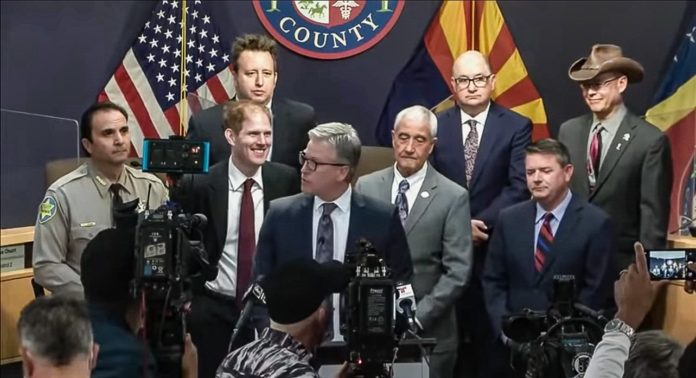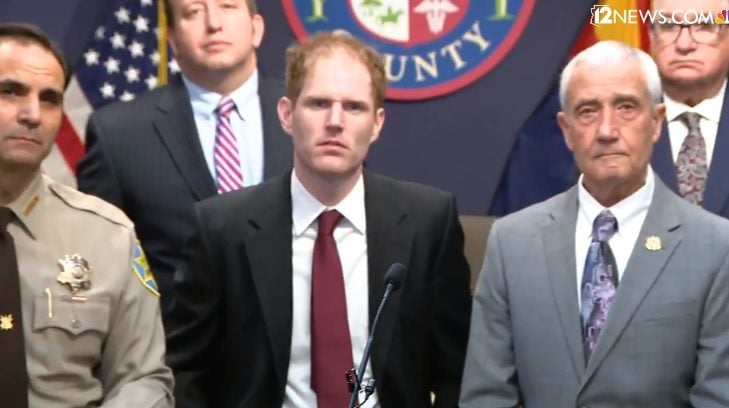On August 6, Arizona Attorney General Mark Brnovich began an investigation into Maricopa County’s noncompliance with legislative subpoenas.
The Arizona Senate has subpoenaed the County multiple times with ongoing noncompliance. The materials requested are necessary to finish the full forensic audit of Maricopa County’s 2020 election.
Arizona State Senator Sonny Borrelli requested AG Brnovich to investigate the County’s noncompliance with the legal and enforceable subpoenas.
In a notice to Maricopa County, the Attorney General’s office requested a written response by Friday, August 20.
Maricopa County responded yesterday, claiming innocence and asking the Attorney General to take no further action.
VIA FIRST-CLASS MAIL AND E-MAIL
Re: Response to Legislator Request for Investigation
Dear Deputy Solicitor General Catlett:
On behalf of the Maricopa County Board of Supervisors (“MCBOS”), we respond to your letter dated August 6, 2021 regarding Senator Sonny Borrelli’s Request for Investigation (the “Request”) as to MCBOS’ alleged “failure to comply with valid and enforceable legislative subpoenas that originated from the AZ State Senate.” [Request, Exhibit A]. Specifically, Senator Borrelli claims that MCBOS is acting in conflict with A.R.S. §§ 41-1151, 1153-54 and 16-624 [see Ex. 1 at 1] by failing to produce certain documents and electronic materials requested in a legislative subpoena issued on July 26, 2021 (the “Subpoena”). [Ex. A at Attachment; see also Subpoena, Exhibit B].
The allegations in the Request are without merit. The Senate’s authority to enforce the Subpoena through its statutory contempt powers expired on June 30, 2021 with the adjournment of the legislative session. Accordingly, any action taken by MCBOS in relation to the Subpoena did not “violate[] state law or the Constitution of Arizona,” and we respectfully ask that your Office “take no further action” regarding the Request. A.R.S. § 41-194.01(A), (B)(3).1
On August 2, 2021, MCBOS provided written responses and objections to the Subpoena (the “Objection”). [Objection, Exhibit C].3 In pertinent part, the Objection advises that: (i) MCBOS “has already produced every responsive record in its custody and control” relating to Request No. 3, and it does not possess any passwords to access the ballot tabulation devices used in connection with the general election [see Ex. C at 2]; and (ii) in lieu of producing its routers (which would put sensitive, confidential data at risk, render law enforcement vulnerable to hackers, and disrupt operations costing millions of dollars), MCBOS has already provided numerous items in satisfaction of Request Nos. 5 and 6—i.e., windows event logs, precinct-based tabulator logs, central count tabulator logs, election management system workstations, sever logs, and all of the election tabulation equipment used in the general election—which sufficiently enable the Senates’ auditor to determine whether the tabulation equipment connected to the internet at any point during the election. [Id. at 3].
II. Relevant Law
The statutory scheme of A.R.S. § 41-1151 et seq. governs the issuance and enforcement of legislative subpoenas. Specifically, “the presiding officer of either house or the chairman of any committee” is authorized to issue a subpoena pursuant to A.R.S. § 41-1151, and the senate or the house is authorized to enforce the subpoena through the contempt powers conferred under A.R.S. §§ 41-1153, 1155.4 The power of the legislature to punish for contempt, however, expires with the adjournment of the legislative session. See Buell v. Superior Court of Maricopa County, 96 Ariz. 62, 64, 391 P.2d 919, 921 (1964).
A.R.S. § 41-1153 provides:
A. If a witness neglects or refuses to obey a legislative subpoena, or, appearing, neglects or refuses to testify, the senate or the house may, by resolution entered in the journal, commit him for contempt.
B. A witness neglecting or refusing to attend in obedience to a subpoena may be arrested by the sergeant-at-arms and brought before the senate or house upon authority of a copy of the resolution signed by the president or speaker, and countersigned by the secretary or chief clerk.
(Emphasis added).
The Arizona legislature cannot introduce, vote or enter a resolution in the journal when it is not in session. The powers of contempt conferred under A.R.S. § 41-1153 therefore dissolve upon adjournment until a new legislative session convenes.
Similarly, A.R.S. § 41-1155 provides, in pertinent part:
A. Each house of the legislature may punish as a contempt, and by imprisonment, a breach of its privileges, or the privileges of its members, but only for one or more of the following offenses:
3. Refusing to attend, or to be examined as a witness, either before the house or a committee, or before any person authorized by the house or by a committee to take testimony in legislative proceedings.
B. No term of imprisonment shall extend beyond final adjournment of the session.
A.R.S. § 41-1155(B) is unambiguous: The legislature’s power to enforce a subpoena by imprisonment expires at the end of the legislative session.III. The Senate Failed to Enforce the Subpoena Prior to Adjournment of the Session
The relevant facts and statutory authority, as outlined above, clearly establish the Request is meritless. The Subpoena was issued on July 26, 2021—i.e., twenty-six (26) days after adjournment of the legislative session. Accordingly, even if MCBOS failed to comply with the Subpoena as alleged in the Request (it did not as articulated in the Objection [see Ex. C]), the Senate cannot use its powers of contempt under A.R.S. §§ 41-1153, 1155 to enforce the Subpoena.5
IV. Conclusion
For the reasons outlined above, the Senate’s authority to enforce the Subpoena expired on June 30, 2021, there has been no resolution holding MCBOS in contempt, and therefore, no violation of “state law or the Constitution of Arizona.” We respectfully ask that your Office “take no further action” regarding the Request. A.R.S. § 41-194.01(B)(3).
If you wish to discuss this matter further, please do not hesitate to give me a call. There should be a mechanism to resolve this issue without expensive litigation and the use of court resources.
What is the alternative mechanism that the Supervisors’ attorneys propose? What are they prepared to pay to avoid expensive litigation?
The County continues to spout off, making bogus claims that sensitive data is at risk if they provide router access, or that the auditors already have everything that they need.
If the auditors had everything they needed, the audit would be completed by now.
Sensitive data wouldn’t be at risk if the election equipment was completely separated from the Maricopa County network as they claim.
CLAIM: Maricopa County’s Tabulation System is connected to the internet.
FACTS: Maricopa County uses an air gapped system, meaning its tabulation equipment is never connected to the internet and is completely separated from the Maricopa County Network.
— Maricopa County (@maricopacounty) July 16, 2021
Their new excuse is that Sine Die, adjournment of the legislature terminates the Senate’s authority to enforce the subpoenas.
Arizona Legislators already knew this, and this is why the Attorney General needs to enforce these legal subpoenas.
Next week, the Arizona audit preliminary report will be delivered to the Arizona Senate.
Breaking Development: Arizona Audit Preliminary Report To Be Delivered NEXT WEEK
The coming results will give the Senate and the Attorney General more ammunition against the County.
We still expect a major delta in the counted total and the certified total numbers of ballots.
The people of Arizona, Mark Brnovivch’s constituents respectfully ask that he identify and punish this violation of the law.
Tell Brnovich what you want. Contact him NOW.
(602) 542-5025
Attorney General Brnovich needs to do the right thing now.
The post BREAKING: Maricopa County Responds To Attorney General’s Office – Requests “No Further Action” Be Taken appeared first on The Gateway Pundit.



